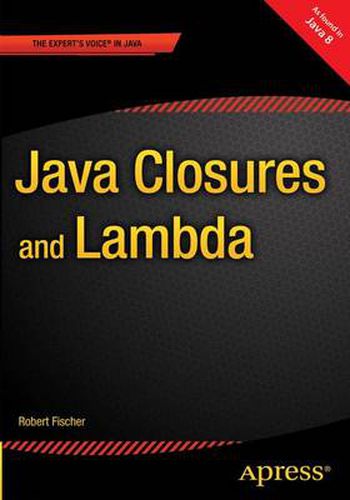Readings Newsletter
Become a Readings Member to make your shopping experience even easier.
Sign in or sign up for free!
You’re not far away from qualifying for FREE standard shipping within Australia
You’ve qualified for FREE standard shipping within Australia
The cart is loading…






This title is printed to order. This book may have been self-published. If so, we cannot guarantee the quality of the content. In the main most books will have gone through the editing process however some may not. We therefore suggest that you be aware of this before ordering this book. If in doubt check either the author or publisher’s details as we are unable to accept any returns unless they are faulty. Please contact us if you have any questions.
Java Closures and Lambda introduces you to significant new changes to the Java language coming out of what is termed Project Lambda. These new changes make their debut in Java 8, and their highlight is the long-awaited support for lambda expressions in the Java language. You’ll learn to write lambda expressions and use them to create functional interfaces and default methods for evolving APIs, among many other uses.
The changes in Java 8 are significant. Syntax and usage of the language are changed considerably with the introduction of closures and lambda expressions. This book takes you through these important changes from introduction to mastery. Through a set of clear examples, you’ll learn to refactor existing code to take advantage of the new language features. You’ll learn what those features can do for you, and when they are best applied. You’ll learn to design and write new code having these important new features in mind from the very beginning.
Clearly explains the fantastic benefits resulting from Project Lambda
Explains the syntax and IDE support for the new features
Shows how to streamline your code by bringing some of the benefits of functional programming to the Java language
Illustrates parallelism in closures through Stream and Spliterator objects
Explains API evolution by adding methods to existing interfaces without breaking existing interface implementations, a technique addressing potential multiple inheritance issues
$9.00 standard shipping within Australia
FREE standard shipping within Australia for orders over $100.00
Express & International shipping calculated at checkout
Stock availability can be subject to change without notice. We recommend calling the shop or contacting our online team to check availability of low stock items. Please see our Shopping Online page for more details.
This title is printed to order. This book may have been self-published. If so, we cannot guarantee the quality of the content. In the main most books will have gone through the editing process however some may not. We therefore suggest that you be aware of this before ordering this book. If in doubt check either the author or publisher’s details as we are unable to accept any returns unless they are faulty. Please contact us if you have any questions.
Java Closures and Lambda introduces you to significant new changes to the Java language coming out of what is termed Project Lambda. These new changes make their debut in Java 8, and their highlight is the long-awaited support for lambda expressions in the Java language. You’ll learn to write lambda expressions and use them to create functional interfaces and default methods for evolving APIs, among many other uses.
The changes in Java 8 are significant. Syntax and usage of the language are changed considerably with the introduction of closures and lambda expressions. This book takes you through these important changes from introduction to mastery. Through a set of clear examples, you’ll learn to refactor existing code to take advantage of the new language features. You’ll learn what those features can do for you, and when they are best applied. You’ll learn to design and write new code having these important new features in mind from the very beginning.
Clearly explains the fantastic benefits resulting from Project Lambda
Explains the syntax and IDE support for the new features
Shows how to streamline your code by bringing some of the benefits of functional programming to the Java language
Illustrates parallelism in closures through Stream and Spliterator objects
Explains API evolution by adding methods to existing interfaces without breaking existing interface implementations, a technique addressing potential multiple inheritance issues